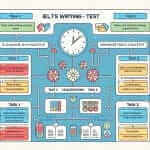The Writing Task 2 section of the IELTS exam consistently proves to be a challenge for many candidates. This essay-type task assesses your ability to construct well-organized, coherent, and grammatically correct arguments. Understanding the common mistakes learners make can significantly improve your performance and overall band score. In this article, we will explore these common pitfalls and provide practical strategies to avoid them.
Understanding Common IELTS Writing Task 2 Mistakes
Misinterpreting the Essay Question
One of the most frequent errors is misinterpreting the question prompt. Candidates often stray off-topic, resulting in irrelevant content. This not only impacts the Task Achievement score but also affects coherence and cohesion.
Example:
For the question, “To what extent do you agree or disagree with the statement that advances in technology have improved our lives?” A common mistake is discussing technology in general, without directly addressing whether it has indeed improved our lives.
Solution:
- Carefully read the essay question.
- Identify the key points, such as “technology” and “improved our lives.”
- Stay focused on addressing these elements throughout your essay.
Lack of Clear Structure
A well-structured essay is essential for coherence and cohesion. However, many candidates fail to organize their essays effectively, affecting the readability and logical flow of their arguments.
Example:
An essay without clear paragraphing or topic sentences can confuse the reader. Each paragraph should ideally consist of a topic sentence, supporting sentences, and a concluding sentence.
Solution:
- Plan your essay before writing.
- Use a clear structure: introduction, body paragraphs, and conclusion.
- Ensure each paragraph has a clear main idea and logical flow.
Limited Range of Vocabulary
A limited vocabulary can hinder your ability to express ideas precisely and vividly. Overuse of basic words and repetitive language can detract from your Lexical Resource score.
Example:
Using “good” and “bad” repeatedly instead of more specific terms like “beneficial,” “advantageous,” “detrimental,” or “harmful.”
Solution:
- Learn and practice using a wide range of vocabulary.
- Use synonyms and varied expressions to avoid repetition.
- Be precise in word choice to convey your arguments effectively.
Inaccurate Grammar and Sentence Structures
Grammatical errors and awkward sentence structures can significantly impact the Grammatical Range and Accuracy score. These mistakes can range from incorrect tenses, subject-verb agreement errors, to poorly constructed sentences.
Example:
Incorrect: “People is happier when they have a good job.”
Correct: “People are happier when they have good jobs.”
Solution:
- Brush up on fundamental grammar rules.
- Practice writing complex and compound sentences.
- Seek feedback on your writing to identify and correct recurring errors.
Inadequate Support for Arguments
Providing insufficient examples and explanations to support your points can weaken your argument. This can lead to a lower score in Task Response.
Example:
Stating that “education is important” without elaborating on why it is essential and providing real-world examples or evidence.
Solution:
- Support each point with specific examples, statistics, or anecdotes.
- Explain how each example relates to your argument.
Applying These Tips in Actual IELTS Writing Task 2 Prompts
Example Analysis and Application
Prompt: “Some people believe that unpaid community service should be a compulsory part of high school programs (for example working for a charity, improving the neighborhood, or teaching sports to younger children). To what extent do you agree or disagree?”
-
Understanding the Question:
Focus on whether unpaid community service should be mandatory. -
Clear Structure:
- Introduction: Paraphrase the prompt and state your position.
- Body Paragraph 1: Argue in favor (with examples and explanations).
- Body Paragraph 2: Argue against (with examples and explanations).
- Conclusion: Summarize your stance and restate the main points.
-
Rich Vocabulary:
Use terms like “mandatory,” “integral,” “civic responsibility,” “extracurricular activities,” etc. -
Accurate Grammar and Sentences:
Use a variety of sentence structures and ensure grammatical accuracy. -
Sufficient Support:
Provide specific examples such as, “In many countries, students who participate in community service programs have higher rates of college admission and exhibit enhanced social skills.”
 IELTS Writing Task 2 Example
IELTS Writing Task 2 Example
Avoiding Common Pitfalls
Common Errors to Watch Out For
- Off-topic Content: Delete or rework irrelevant sections.
- Redundancy: Use a variety of expressions and synonyms to avoid repetition.
- Overly Complex Sentences: Strive for clarity and precision.
- Lack of Evidence: Always back up your points with examples or data.
Practicing Effective Techniques
- Regular Writing Practice: Practice with diverse essay prompts.
- Peer Review: Exchange essays with peers for constructive feedback.
- Timely Revisions: Edit and refine your essays to improve accuracy and coherence.
Conclusion
By understanding and avoiding these common mistakes, you can significantly improve your IELTS Writing Task 2 performance. Focus on staying relevant, structuring your essay effectively, using a rich vocabulary, maintaining grammatical accuracy, and supporting your arguments with concrete examples. With consistent practice and mindful application of these strategies, you are well on your way to achieving a higher band score.
Feel free to leave a comment below with any questions or share your experiences. Explore more articles on [Website Name] to further enhance your IELTS preparation journey.


